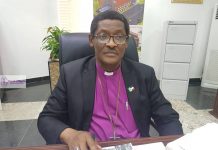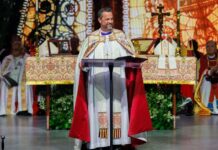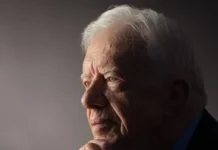The beginning of a new year comes with a yearning for a fresh start. Traditional images shift from Father Time, as an elderly man bowed with age, to a new baby with potential and promise for life just beginning. Given the year we have just had, we certainly want a fresh start — a new year without a pandemic. We often approach this fresh start each year with the tradition of New Year resolutions. We say, “This year I will stop smoking; diet properly; exercise more; drink less; or, spend more time with the children.” We all have a list of fresh starts we want to begin or at least think we should begin.
However, the New Year is not a complete fresh start. We enter the year with history, burdens, habits, attitudes, practices and consequences of the past that come with us. We are not reborn on January 1st like a baby with no memory.
The pandemic is not over. We have months ahead of us of continued social distancing, mask-wearing and carefulness in group contacts. And 2020 has opened up deep wounds that we carry with us into this New Year.
In the early months of 2020, we saw the vulnerability of our seniors in long-term care, places where COVID-19 rampaged, killing many and was exacerbated due to the employment structures of part-time multi-employer staff. We realized that the people most essential to our life are called to put their lives at risk so that we can have food and healthcare and many are poorly paid for that sacrifice. We have seen Indigenous communities in the second wave facing a COVID-19 infection rate of 70%, due lack of adequate healthcare; crowded living conditions; lack of resources.
Names have become symbolic of wounds in our social fabric. George Floyd and Barbara Kentner revealed the depths of systemic racism in North America—including Canada, where we like to think we are not implicated—while statistics and Black, Indigenous and people of colour, tell us otherwise. Regis Korchinski-Paquet and Chantel Moore tell the story of how we fail those suffering with mental illness, even as we place police forces in circumstances for which they are not trained, leading to tragic consequences.
Every week I receive multiple heart-wrenching pleas for refugee sponsorship from people who are trapped in camps or in countries where they cannot work and are not welcome and they are desperate for help for the sake of their family.
Under the weight of so much pain and suffering, I know my heart has felt a new and deeper grief. Why? Because we have an inner compass that knows these should not happen. We know better ways to live. We know that the tenets of the Golden Rule — “Do unto others as you would them do unto you” — and know it is not being honoured. None of these situations will be changed by the passage from 2020 to 2021. We bring these wounds with us. The societal shifts needed are overwhelming and lead to a sense of powerlessness and grief.
Recently I attended a webinar on mental health for clergy. In this webinar, I was introduced to terms that have given me a new language for what I had termed as ‘grief’, because ‘grief’ was not sufficient for the depth and power of despair I felt. A language that describes this feeling is ‘moral injury’. That term has arisen in psychological literature concerning military personnel, similar (though not identical) to PTSD. A moral injury is ‘… the damage done to one’s conscience or moral compass when that person perpetrates, witnesses or fails to prevent acts that transgress one’s own moral beliefs, values or ethical codes of conduct.’
When I heard this definition, it resonated deeply with my experience of the events of the past year — and frankly, the layering of events we have seen over many years, including our complicity in Residential Schools and the work of decolonization still needed. There is a gap between this reality and what we profess in our baptismal covenant and see in scripture, in passages like Revelation 21:1–6, where weenvision a time when God will dwell in our midst and wipe every tear away and there will be no more sorrow or crying or pain. We envision the ‘new Jerusalem — city of God’ as a place:
- of justice, mercy, compassion for all people;
- of dignity and care where loving neighbour as self is exercised for all;
- of honouring our elders;
- of caring for the most vulnerable; and,
- of structuring our world so that we value those most essential to our health and well-being.
Although we know the reign of God has not yet come in full, the depth of the gap between our longing, our actions and the present reality is often invisible to us. COVID-19 ripped away any veils between us and its reality, and showed us the breadth and depth of the work we are called to.
A moral injury requires us to acknowledge that we share in the pain of the world. We share responsibility for the pain that we have inherited from past generations; the pain that we have caused; and the pain that we have ignored or not seen and we must share in all that can be done to bringing the first signs of healing and glimpses of the reign of God.
Coming face to face with the pain of the world, will we see it around us and take steps towards healing that injury? We cannot heal the whole world at once, but we can begin with one step every day — one act of mercy; one recognition of injustice we oppose; one letter of advocacy for change; one refusal to be complicit with a racist comment. We need to focus on the actions and words that are within our power — however small they may seem — and commit to doing them. The biggest changes begin with one step. We must also commit to seeing the pain, listening to those at its heart and be willing to enter the long haul of change that starts with one step and may take years to complete.
We also need to look for and hold up the many, many actions of others that are moments of grace and healing and hope. I am deeply grateful to live in Canada where financial relief was offered so quickly to so many in the pandemic; where our government has acted to ensure availability of the vaccine; where healthcare workers have worked tirelessly to protect and care for patients; where, when needed, our military can provide on-the-ground assistance to desperate communities; and, where Canadians are rightly advocating for equitable distribution of the vaccine, the rights of migrants workers and a living basic income.
I am deeply grateful for: the resilience of our church communities; for clergy who pivoted quickly to online forms of worship; for bishops and clergy who offer daily morning/evening prayer, compline or messages of hope; for musicians of have found new ways to offer music and hymns; for Wardens and parishioners who have stepped up to the challenges of new protocols and constantly changing limitations; for parishes whose outreach ministries quickly changed from in-house community dinners or food banks, to pre-packed and delivered meals; for wonderfully creative ways to cheer up spirits — drive-by birthday celebrations, drive-through living creches, Advent craft bags for families, and Gospel Jamborees on radio and online sharing the richness of Indigenous music-making to the glory of God.
We see the New Year as a fresh start — but we carry with us the burdens of the past years. Let us be the fresh start that is needed. Name the pain we feel and make a resolution to commit afresh to one step a day towards healing and hope. That resolution will need courage and perseverance. Thankfully we do not enter the year alone. We enter it with Christ and all who have gone before us in this journey.
“Therefore, since we are surrounded by so great a cloud of witnesses,
let us also lay aside every weight and the sin that clings so closely,
and let us run with perseverance the race that is set before us,
looking to Jesus the pioneer and perfecter of our faith,
who for the sake of the joy that was set before him
endured the cross, disregarding its shame,
and has taken his seat at the right hand of the throne of God.”
(Hebrews 12:1–2)










